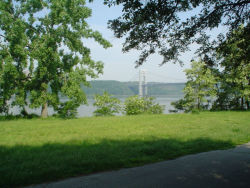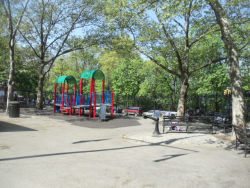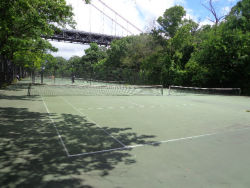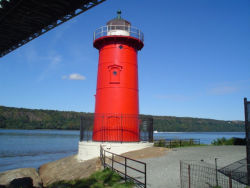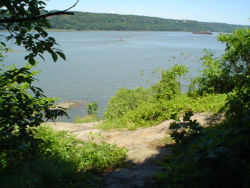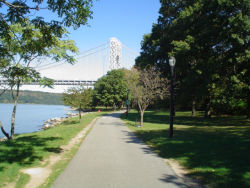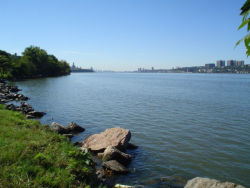Fort Washington Park
The Little Red Lighthouse
The Little Red Lighthouse stopped being used as a functional lighthouse long ago, but over the years this 40-foot-high structure has become a beacon of another kind. Located underneath the George Washington Bridge along this treacherous section of the Hudson River once known as Jeffrey’s Hook, this is one of the few surviving lighthouses in New York City and serves as a quaint reminder of the area’s history.
Long ago, Native Americans known locally as the Weckquaesgeek —part of the Lenape tribe—inhabited much of upper Manhattan and eastern New Jersey. The Weckquaesgeek, and later the Dutch and English colonists, fished and hunted along the banks of the Hudson River. The Hudson was also an important route for travel, connecting upstate cities such as Albany to New York City and the Atlantic Ocean. As traffic increased along the river, so did the number of shipwrecks at Jeffrey’s Hook. In an attempt to reduce accidents, a red pole was placed at Jeffrey’s Hook jutting out over the river to warn travelers of danger. In 1889, two 10-candlepower lanterns were placed on the pole to aid navigation. Much of the land surrounding the lighthouse, including the riverbanks of Jeffrey’s Hook, was acquired by the City in 1896, and became known as Fort Washington Park.
In the early 20th century, barge captains carrying goods up and down the Hudson demanded a brighter beacon. The Little Red Lighthouse had been erected on Sandy Hook, New Jersey in 1880, where it used a 1,000 pound fog signal and flashing red light to guide ships through the night. It became obsolete and was dismantled in 1917. In 1921, the U.S. Coast Guard reconstructed this lighthouse on Jeffrey’s Hook in an attempt to improve navigational aids on the Hudson River. Run by a part-time keeper and furnished with a battery-powered lamp and a fog bell, the lighthouse, then known as Jeffrey’s Hook Lighthouse, was an important guide to river travelers for ten years. The George Washington Bridge opened in 1931, and the brighter lights of the bridge again made the lighthouse obsolete. In 1948, the Coast Guard decommissioned the lighthouse, and its lamp was extinguished.
The Coast Guard planned to auction off the lighthouse, but an outpouring of support for the beacon helped save it. The outcry from the public was prompted by the children’s book, The Little Red Lighthouse and the Great Gray Bridge, written by Hildegarde Swift and Lynd Ward in 1942. In the popular book, the Little Red Lighthouse is happy and content until a great bridge is built over it. In the end, the lighthouse learns that it still has an important job to do and that there is still a place in the world for an old lighthouse. The classic tale captured the imaginations of children and adults, many of whom wrote letters and sent money to help save the icon from the auction block.
On July 23, 1951, the Coast Guard gave the property to NYC Parks, and on May 29, 1979, the Little Red Lighthouse was added to the National Register of Historic Places. It did not receive much attention over the years, until City Comptroller Harrison J. Goldin worked with Parks Commissioner Henry J. Stern to find funding for its restoration. In 1986, NYC Parks hosted a party in honor of the lighthouse’s 65th anniversary and to celebrate a renovation of the lighthouse that included reconstruction of the concrete foundation and installation of new steel doors. In 2000, the lighthouse received a fresh coat of red paint that was true to its original, historic color, along with new interior lighting and electric lines. Today, the Little Red Lighthouse remains a stalwart symbol of the area’s heritage, lighting the way into the city’s past.
The Little Red Lighthouse is owned by NYC Parks and is part of the Historic House Trust of New York City.
Check out your park's Vital Signs
Clean & Safe
Green & Resilient
Empowered & Engaged Users
Share your feedback or learn more about how this park is part of a
Vital Park System

Know Before You Go


